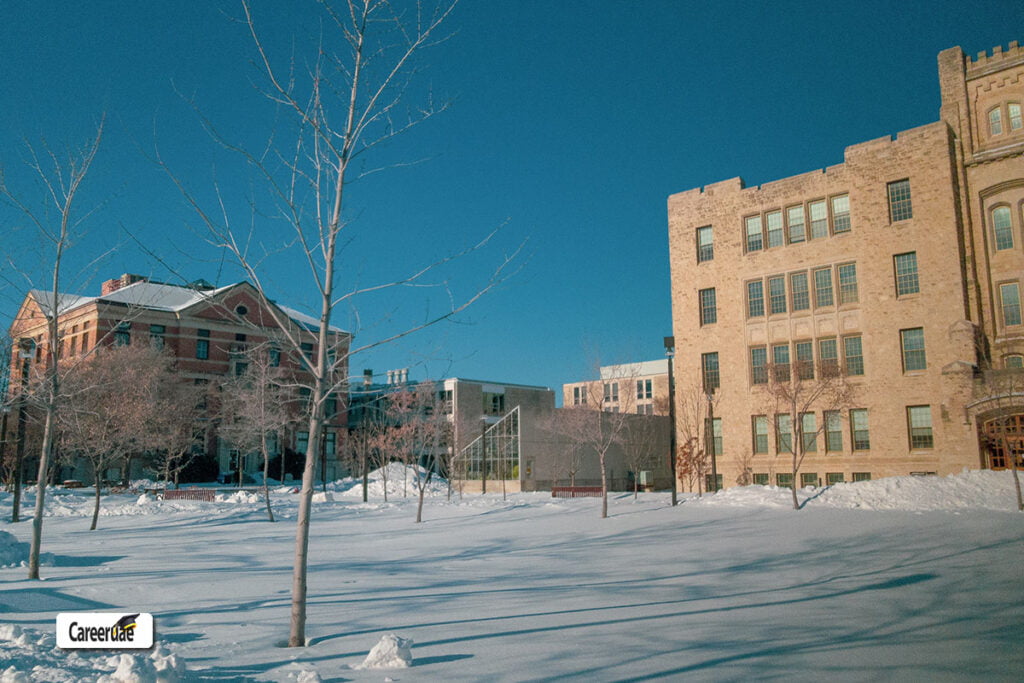Studying in Canada as an international student requires thorough research on the admission process, eligibility criteria, and obtaining a student visa. Additionally, it is important to explore scholarship opportunities and understand the cost of living in Canada.
Developing a study plan and initiating the application process well in advance is crucial for a successful application. Building a strong academic profile and showcasing extracurricular activities can help increase your chances of being accepted into a Canadian institution. It is also recommended to seek guidance from educational consultants or the international office of your desired university to ensure you are well-prepared for the process.
With proper planning and diligent efforts, studying in Canada as an international student can be an enriching experience.
Benefits Of Studying In Canada As An International Student
Studying in Canada as an international student offers numerous benefits, including high-quality education, diverse cultural experiences, and excellent opportunities for career advancement. With its world-class universities and welcoming atmosphere, Canada is a top destination for those seeking a global education.
Studying in Canada as an international student opens up a world of opportunities and experiences. In this section, we will explore the benefits of pursuing your education in this beautiful country. From high-quality education to a diverse and inclusive culture, Canada offers a nurturing environment for students from all corners of the globe.
High-Quality Education:
- Renowned for its commitment to excellence, Canada offers high-quality education that is globally recognized.
- Canadian educational institutions are known for their rigorous academic standards, innovative research, and state-of-the-art facilities.
- The emphasis on practical learning ensures that students gain real-world skills and experience, preparing them for successful careers.
- With a wide range of programs and courses to choose from, students can tailor their education to suit their interests and career goals.
Diverse And Inclusive Culture:
- Canada takes pride in its multicultural society, making it a welcoming and inclusive place for international students.
- Students from all backgrounds are embraced and celebrated, contributing to a vibrant learning environment.
- The opportunity to interact with people from different cultures and perspectives enriches the overall educational experience.
- Canada’s commitment to diversity and inclusion fosters a sense of acceptance and promotes global understanding.
Access To World-Class Universities And Colleges:
- Canada is home to renowned universities and colleges that consistently rank among the best in the world.
- Institutions such as the University of Toronto, McGill University, and the University of british columbia offer a wide range of programs and opportunities for students.
- Studying at these institutions provides access to world-class faculty, cutting-edge research, and abundant resources.
- The robust academic environment stimulates intellectual growth and encourages students to excel in their chosen fields.
Canada holds immense appeal for international students seeking a high-quality education, a diverse and inclusive culture, and access to world-class educational institutions. Now that you are familiar with the benefits of studying in Canada, you can make an informed decision about pursuing your educational journey in this remarkable country.

Steps To Study In Canada As An International Student
Discover the step-by-step process for studying in Canada as an international student. From researching universities to obtaining a study permit, this guide provides essential information for a seamless transition to Canadian higher education.
Research And Choose A Study Program
To study in Canada as an international student, it is crucial to research and select a suitable study program. Here are some steps to help you in this process:
- Explore various universities and colleges in Canada: Research the available study programs in different institutions to find the one that aligns with your interests and career goals.
- Consider your academic qualifications and requirements: Ensure that you meet the academic prerequisites for your chosen program by checking the admission criteria provided by the institutions.
- Evaluate the program’s curriculum and structure: Take a closer look at the courses offered, program duration, and any additional requirements, such as internships or a thesis.
- Read reviews and testimonials: Look for feedback from current or past students to gain insights into the quality of the program and the overall experience at the institution.
- Seek guidance from education consultants or representatives: Consult professionals who specialize in assisting international students with university selection. They can provide valuable advice based on your preferences and academic background.
Meet The Admission Requirements
Meeting the admission requirements is a vital step in securing a spot at your desired institution in Canada. Here are the essential elements to consider:
- High school diploma or equivalent: Ensure that you possess the necessary educational qualifications required for admission to the program you wish to pursue.
- Language proficiency: Most Canadian institutions require proof of english or french language proficiency. You may need to take tests like the ielts, toefl, or dalf to demonstrate your language skills.
- Entrance exams: Certain programs or universities may require specific entrance exams, such as the sat or act for undergraduate studies, or the gre/gmat for graduate programs.
- Submitting transcripts: Gather and submit official transcripts from your previous academic institutions, including translated versions if necessary.
- Prepare letters of recommendation: Request letters of recommendation from teachers or professors who can attest to your academic abilities and personal qualities.
- Write a statement of purpose: Craft a well-written statement outlining your academic goals, reasons for pursuing the program, and how it aligns with your future aspirations.
Apply To The Selected Institution
After thorough research and meeting the admission requirements, it’s time to submit your application to your chosen institution. Here’s what you need to do:
- Fill out the application form: Complete the online application form provided by the institution. Ensure accurate information and double-check for any errors.
- Pay the application fee: Some institutions require an application fee, which varies from one school to another. Make sure to submit the fee within the specified timeframe.
- Gather and submit supporting documents: Collect all the necessary documents, such as transcripts, letters of recommendation, statement of purpose, and proof of language proficiency. Submit them according to the institution’s instructions.
- Track the application status: Stay informed about the status of your application by regularly checking the institution’s online portal or contacting the admissions office.
- Keep copies of all documents: Maintain copies of all the documents submitted for future reference or in case they are required during the visa application process.
Obtain A Study Permit
To study in Canada as an international student, obtaining a study permit is mandatory. Here’s what you need to know about the process:
- Research the study permit requirements: Visit the official website of immigration, refugees and Citizenship Canada (ircc) to understand the study permit application process and gather the necessary documents.
- Apply for a study permit online: Complete the online application for a study permit and pay the associated fees.
- Submit supporting documents: Provide all the required supporting documents, including your letter of acceptance, proof of financial capabilities, and a valid passport.
- Biometrics and medical examination: Depending on your country of origin, you may need to undergo a biometrics appointment and a medical examination to meet the immigration requirements.
- Wait for a decision: After submitting the study permit application, wait for a response from the ircc. Be patient, as processing times can vary.
- Travel restrictions due to covid-19: Stay updated on any travel restrictions or additional requirements related to the ongoing pandemic that may affect your study permit application or travel plans.
Prepare For The Journey To Canada
Once you have received your study permit, it’s time to prepare for your journey to Canada. Here are some essential steps to follow:
- Book your travel tickets: Research and book your airline tickets in advance to secure the best available options.
- Arrange accommodation: Explore accommodation options near your institution and make the necessary arrangements, whether it’s on-campus housing or off-campus rentals.
- Pack your essentials: Make a checklist and pack your essential items, including clothing suitable for the Canadian climate, important documents, electronic devices, and any prescribed medications.
- Plan your finances: Familiarize yourself with the Canadian banking system and ensure that you have sufficient funds to cover your tuition fees, living expenses, and any additional costs.
- Attend pre-departure orientations: Some institutions offer pre-departure orientations or webinars to help international students adapt to life in Canada. Take advantage of these sessions to gather useful information.
- Stay updated on covid-19 protocols: Stay informed about the latest covid-19 regulations and guidelines established by the Canadian government and your institution.
Preparing in advance and following these steps will help you navigate the process of studying in Canada as an international student smoothly and efficiently. Good luck with your educational journey!
Choosing The Right Institution
Choosing the right institution is crucial for international students looking to study in Canada. Consider factors like program offerings, campus facilities, location, and support services to ensure a successful academic journey.
Studying in Canada as an international student is an exciting opportunity that offers a diverse range of academic and cultural experiences. Before embarking on this educational adventure, it is essential to choose the right institution that aligns with your academic goals and aspirations.
With numerous universities and colleges in Canada to choose from, it’s important to consider several factors before making a decision.
Factors To Consider When Selecting A University Or College:
- Location: Determine whether you prefer a vibrant city atmosphere or a more serene setting. Consider the climate, cost of living, and proximity to attractions or amenities that are important to you.
- Academic programs: Look for institutions that offer the specific courses or programs you are interested in pursuing. Research the curriculum, faculty expertise, and opportunities for research or internships in your field of study.
- Rankings and reputation: Review the rankings and reputation of the universities or colleges you are considering. Check for accreditation and consider the institution’s history, alumni success, and overall recognition in your desired field.
- Cost and scholarships: Evaluate the tuition fees and living expenses associated with studying in Canada. Explore scholarship and funding opportunities available to international students that can help offset the costs.
- Campus facilities and resources: Take into account the quality of on-campus facilities such as libraries, laboratories, sports facilities, and student support services. Access to resources like career services, counseling, and extracurricular activities can enhance your overall university experience.
- Diversity and student support: Consider the institution’s commitment to diversity and inclusivity. Look for services and support systems aimed at assisting international students with their transition to Canada, including language support, cultural activities, and housing assistance.
- Alumni network and career opportunities: Research the alumni network and the institution’s connections with industry partners. Consider the availability of co-op or internship programs that can provide practical work experience and enhance your career prospects.
- Student life and extracurricular activities: Discover the social and cultural opportunities available on campus. Consider clubs, organizations, and events that align with your interests, as they can enhance your overall university experience and foster a sense of community.
Top Universities And Colleges In Canada:
- University of Toronto: Known for its academic excellence and diverse student population, the University of Toronto offers a wide range of programs across various disciplines. It consistently ranks among the top universities in Canada and provides a vibrant campus life.
- McGill University: Located in Montreal, McGill University is renowned for its research-intensive programs and vibrant cultural scene. It offers a diverse array of undergraduate and graduate programs, attracting students from around the world.
- University of British Columbia: Located on the west coast of Canada, the University of British Columbia boasts stunning campus scenery and world-class academics. It offers a wide range of programs and has a strong focus on sustainability and innovation.
- Humber College: Known for its hands-on learning approach and industry connections, Humber College offers a variety of programs in fields such as business, media, and technology. It provides students with valuable practical skills and opportunities for career advancement.
- Seneca college: With campuses in Toronto, Seneca college is known for its cutting-edge programs and focus on experiential learning. It offers a wide range of programs in fields such as health sciences, business, and arts.
Choosing the right institution is a crucial step in your journey as an international student in Canada. Consider these factors and explore the top universities and colleges to find the perfect fit for your academic and personal growth. Remember to thoroughly research and weigh your options before making a decision.
Good luck in your pursuit of higher education in Canada!
Eligibility Criteria For A Study Permit
To study in Canada as an international student, it is important to meet the eligibility criteria for a study permit. These criteria include having an acceptance letter from a designated learning institution, proving financial stability, and demonstrating a clean criminal record.
Securing a study permit allows individuals to pursue their educational goals in Canada.
Studying in Canada as an international student can be an exciting opportunity to gain a high-quality education and explore a new culture. However, before embarking on your educational journey, it’s important to understand the eligibility criteria for obtaining a study permit.
In this section, we will delve into the key requirements that you need to fulfill in order to obtain a study permit in Canada.

Proof Of Acceptance From A Designated Learning Institution:
- You must provide proof of acceptance from a designated learning institution (dli) in Canada. A dli is a school, college, or university approved by the Canadian government to host international students.
- Ensure that you have received an acceptance letter from a recognized dli before applying for a study permit.
- The acceptance letter should include important details such as the program duration, start date, and any conditions set by the institution.
Proof Of Financial Support:
- Demonstrating that you have enough funds to cover your tuition fees, living expenses, and return transportation is crucial for obtaining a study permit.
- Depending on your circumstances, you may be required to provide proof of a Canadian bank account in your name, a scholarship or sponsorship letter, or proof of loans or investments.
- It’s important to provide sufficient evidence that you can financially support yourself during your studies, to ensure a smooth application process.
Medical Examination Requirements:
- In some cases, you may be required to undergo a medical examination to ensure that you meet the health requirements set by the Canadian government.
- The medical examination should be conducted by an approved panel physician authorized by the Canadian immigration authorities.
- Make sure to schedule the medical examination in advance and provide the necessary documentation when applying for your study permit.
Language Proficiency Requirements:
- Proficiency in english or french is essential for studying in Canada. Depending on the designated learning institution and program, you may need to meet specific language requirements.
- Common language proficiency tests accepted in Canada include the international English language testing system (IELTS) and the test of English as a Foreign Language (TOEFL).
- It’s crucial to achieve the required score on these tests to meet the language proficiency criteria for your study permit.
Meeting the eligibility criteria for a study permit in Canada is essential for international students. Ensuring you have proof of acceptance from a designated learning institution, sufficient financial support, a satisfactory medical examination, and the required language proficiency will increase your chances of obtaining a study permit and pursuing your educational dreams in Canada.
Remember to carefully follow the guidelines provided by the Canadian government and consult with the designated learning institution for any specific requirements related to your chosen program. Good luck with your studies in Canada!
Document Checklist For A Study Permit Application
This document checklist provides a comprehensive guide for international students applying for a study permit in Canada. Ensure you have all the necessary documents to study in Canada hassle-free.
Studying in Canada as an international student can be a rewarding experience, but it does require careful planning and preparation. To help you get started, here is a document checklist for a study permit application:
Application Form:
- Complete the study permit application form (imm 1294), ensuring all sections are filled out accurately and legibly.
- Include the document checklist (imm 5483) confirming that you have included all the required documents.
Letter Of Acceptance:
- Obtain an acceptance letter from a designated learning institution (dli) in Canada.
- Ensure that the letter includes your full name, study program details, start and end dates, and any conditions of acceptance.
Proof Of Financial Support:
- Provide proof that you have enough money to cover your tuition fees, living expenses, and return transportation.
- Acceptable documents may include bank statements, scholarship or sponsorship letters, and/or proof of a Canadian bank account.
Letter Of Explanation:
- Write a letter explaining your academic intentions, why you chose Canada for your studies, and your plans after completing your program.
- Include any relevant information that will help the visa officer understand your study goals and intentions.
Passport And Visa Photographs:
- Submit a photocopy of the personal information page of your passport.
- Include two recent passport-sized photographs of yourself, taken within the last six months.
Medical Examination Documents:
- If you are planning to study in Canada for more than six months, you may need to undergo a medical examination.
- Consult the immigration, refugees and citizenship Canada (ircc) website to find out if you need to complete a medical examination and follow the instructions accordingly.
Language Proficiency Test Results:
- Depending on your chosen program and institution, you may be required to provide proof of language proficiency in English or French.
- Commonly accepted tests include the International English Language Testing System (IELTS), a test of English as a Foreign Language (TOEFL), or the Canadian English Language Proficiency Index Program (celpip).
Remember, this document checklist serves as a guide to help you prepare your study permit application. Be sure to review the specific requirements outlined by ircc and consult with your designated learning institution for any additional documentation they may require.
Good luck with your application!
Tips For A Successful Study Permit Application
Looking to study in Canada as an international student? Check out these helpful tips for a successful study permit application. Ensure your application stands out and increases your chances of being accepted.
Starting your journey as an international student in Canada involves going through the process of applying for a study permit. To ensure a smooth and successful application, here are some helpful tips to guide you through the process:
Start The Application Process Early
- Submitting your study permit application well in advance of your intended start date will give you ample time to address any issues that may arise.
- Early applications also allow for any potential delays in processing, ensuring you have your study permit in hand when you need it.
Understand And Meet The Requirements
- Familiarize yourself with the requirements and eligibility criteria for a study permit in Canada.
- Ensure that you meet the necessary criteria, such as having an acceptance letter from a designated learning institution (dli) and demonstrating sufficient financial resources to cover your tuition fees and living expenses.

Provide Accurate And Complete Documentation
- Prepare all required documents with utmost accuracy, as any errors or omissions can lead to delays or application rejection.
- Double-check that you have included all the necessary forms, identification documents, proof of acceptance, and financial statements, among others, as specified by the Canadian government.
Seek Help From Designated Representatives If Needed
- If you find the study permit application process overwhelming or confusing, do not hesitate to seek assistance from designated representatives.
- Designated representatives, such as immigration consultants or lawyers, can provide expert guidance and ensure that your application adheres to all requirements and regulations.
Applying for a study permit in Canada may seem daunting, but with thorough preparation and attention to detail, you can increase your chances of a successful application. By starting early, understanding the requirements, providing accurate documentation, and seeking help when needed, you’ll be on your way to pursuing your educational aspirations in Canada.
Understanding Canadian Education System
Discover the Canadian education system and how to pursue studies in Canada as an international student. Gain insights into the process, requirements, and opportunities available, ensuring a smooth transition into Canadian academia.
Studying in Canada as an international student is an exciting opportunity to gain a world-class education and immerse yourself in a multicultural environment. Understanding the Canadian education system is crucial for making informed decisions about your academic journey. In this section, we will explore the structure of the education system in Canada and the various types of study programs available to international students.
Structure Of The Education System
The Canadian education system is structured in a way that offers students a wide range of options and flexibility. Here is a breakdown of the key components:
- Elementary and secondary education: Canadian elementary and secondary education is compulsory and lasts for 12 years. Students complete grades 1 to 8 in elementary school and grades 9 to 12 in secondary school. The education system focuses on providing a strong foundation in core subjects like math, science, and language arts.
- Post-secondary education: After completing secondary school, students can pursue higher education at post-secondary institutions such as universities, colleges, and institutes. This level of education is divided into undergraduate and graduate programs.
- Undergraduate programs: Undergraduate programs typically span three to four years, leading to a bachelor’s degree. Students have the option to specialize in a specific field of study, such as business, engineering, or arts. The curriculum includes a combination of core courses, electives, and the opportunity to gain practical experience through internships or co-op programs.
- Graduate programs: Graduate programs are designed for students who have already obtained a bachelor’s degree and wish to pursue advanced studies in their field. These programs include master’s degrees and ph.d. programs. Graduate studies offer the opportunity to conduct research, contribute to scholarly work, and specialize in a specific area of interest.
Types Of Study Programs Available
When it comes to studying in Canada, international students can choose from a variety of study programs tailored to their interests and career goals. Here are some of the most common types of study programs available:
- Degree programs: Degree programs are the most common choice for international students. These programs offer a comprehensive education and lead to a recognized qualification, such as a bachelor’s, master’s, or ph.d. Degree. Degree programs provide in-depth knowledge in a specific field and open doors to various career opportunities.
- Diploma and certificate programs: Diploma and certificate programs are shorter in duration compared to degree programs. These programs focus on specific skill sets and provide practical training for careers in areas such as healthcare, business administration, information technology, and hospitality management. Diploma and certificate programs are an excellent option for students who prefer a more hands-on approach to learning.
- English language programs: Canada is known for its high-quality English language training programs. These programs cater to international students who wish to improve their English language proficiency for academic and professional purposes. English language programs are offered at various proficiency levels and can help students meet the language requirements for admission to Canadian universities and colleges.
- Professional and vocational programs: Professional and vocational programs are designed to equip students with the practical skills and knowledge required for specific careers. These programs focus on areas such as nursing, engineering technology, graphic design, culinary arts, and automotive mechanics. Professional and vocational programs often include hands-on training, internships, and industry partnerships.
- Online learning: With the advancements in technology, online learning has become increasingly popular among international students. Canadian institutions offer a wide range of online programs, allowing students to pursue their studies remotely. Online learning offers flexibility and convenience, making it an ideal choice for students who may have other commitments or prefer a more independent learning experience.
Understanding the Canadian education system is essential for international students embarking on their academic journey in Canada. By familiarizing yourself with the structure of the education system and the types of study programs available, you can make informed decisions and find the right path to achieve your academic and career goals.
Finding Accommodation In Canada
Discovering suitable accommodation in Canada as an international student becomes hassle-free with these helpful tips. From exploring student housing options to utilizing online resources, finding a place to stay during your study journey becomes a seamless process.
On-Campus Housing Options
- Living on-campus as an international student in Canada offers numerous benefits:
- Convenience: On-campus housing is usually located close to the university or college, making it easy for you to attend classes and access campus facilities.
- Community: It provides an opportunity to interact with fellow students, creating a sense of belonging and fostering friendships.
- Support: On-campus housing often includes support services, such as resident advisors, security, and maintenance staff, ensuring a safe and comfortable living environment.
Off-Campus Housing Options
- If you prefer more independence and flexibility, off-campus housing options in Canada can be a great alternative:
- Apartments: Renting an apartment allows you to have your own space, providing privacy and freedom.
- Homestays: Living with a Canadian host family gives you the chance to experience local culture and improve your language skills.
- Shared houses or rooms: Sharing a house or renting a room with other students can be more cost-effective, and it offers opportunities for networking and expanding your social circle.
Tips For Finding Suitable Accommodation
- Start early: Begin searching and applying for accommodation as soon as you receive your offer or acceptance letter from the institution. Competition for housing can be high, especially in popular cities.
- Research the area: Familiarize yourself with the neighborhoods surrounding your institution. Consider factors like safety, proximity to amenities, transportation options, and the overall cost of living.
- Utilize online platforms: Websites and apps specializing in student housing, such as campus housing, off-campus housing 101, or Facebook groups, can help you find suitable accommodation options and connect with other students.
- Budget wisely: Determine your budget before searching for accommodation. Consider not only the monthly rent but also additional costs like utilities, internet, transportation, and groceries.
- Read reviews and ask questions: Look for reviews or testimonials from previous residents and reach out to current students to get firsthand information about the accommodation options you’re considering.
- Check for amenities and policies: Enquire about essential amenities like laundry facilities, kitchen access, parking, and internet connectivity. Additionally, understand the accommodations’ policies regarding guests, quiet hours, and lease agreements.
- Secure necessary documents: Be prepared to provide necessary documents and paperwork, such as identification, proof of enrollment, and references, when applying for housing.
- Consider cultural preferences: Depending on your preferences, you might have specific cultural requirements for your living arrangements. For example, if you require halal food, ensure the accommodation can cater to your dietary needs.
- Visit before committing: If possible, visit the accommodation in person or arrange a virtual tour to get a better sense of the space and surroundings before making a final decision.
- Remain adaptable: Be open to exploring different accommodation options based on availability and suitability. Flexibility can increase your chances of finding suitable housing.
Managing Finances As An International Student
Studying in Canada as an international student can be an exciting opportunity, but managing finances is crucial. Learn how to navigate financial challenges and make informed decisions in order to have a successful experience in Canada.
Understanding Tuition Fees And Living Costs In Canada
- Tuition fees in Canada vary depending on the university and program you choose. The average annual tuition fees for international students range from $20,000 to $40,000 CAD.
- Apart from tuition fees, you need to consider living costs such as accommodation, food, transportation, and personal expenses.
- The cost of living in Canada also varies by city. Major cities like Vancouver and Toronto tend to have higher living expenses compared to smaller cities.
- It’s crucial to research and calculate the total expenses, including tuition fees and living costs, to effectively plan your budget and manage your finances while studying in Canada.
Financial Support Options
- Scholarships: Many Canadian universities offer scholarships specifically for international students. These scholarships can help cover a significant portion of your tuition fees and living expenses.
- Government grants: Certain provinces and the Canadian federal government provide grants and bursaries for international students, particularly those with exceptional academic achievements or financial need.
- Part-time jobs: International students in Canada are eligible to work part-time while studying. Working part-time can provide you with additional income to support your studies and cover living expenses.
- Private loans: If you require additional financial assistance, you can explore private loan options. However, it’s essential to carefully consider the terms and interest rates before taking on any loans.
Budgeting Tips For International Students
- Create a realistic budget: Analyze your income and expenses to develop a realistic budget. Consider your tuition fees, accommodation costs, transportation, groceries, and other necessary expenses.
- Seek cost-effective accommodation: Opt for shared accommodation or on-campus housing, as they are often more budget-friendly options compared to living alone or renting an entire apartment.
- Cook at home: Eating out can be expensive, so learn to cook simple and nutritious meals at home. This practice can save you a significant amount of money in the long run.
- Utilize student discounts: Many businesses in Canada offer discounts for students. Take advantage of these discounts by showing your student id whenever possible.
- Limit unnecessary expenses: Be mindful of your discretionary spending. Avoid impulse buying and unnecessary expenses to make your money go further.
- Plan for emergencies: Set aside a small portion of your income as an emergency fund. This can help you cover unforeseen expenses that may arise during your time as an international student.
By understanding tuition fees, exploring financial support options, and following budgeting tips, you’ll be well-equipped to manage your finances effectively while studying in Canada. With proper budgeting and financial planning, you can focus on your education and make the most of your time as an international student.
Adapting To Canadian Culture And Lifestyle
Studying in Canada as an international student involves adapting to the Canadian culture and lifestyle. Immersing yourself in the local customs, embracing diversity, and participating in community activities can enhance your experience and broaden your horizons.
Studying in Canada as an international student offers a world of exciting opportunities. Not only will you gain a top-quality education, but you’ll also have the chance to immerse yourself in the rich Canadian culture and lifestyle. Adapting to a new culture can come with its challenges, but with a little guidance, you’ll be well on your way to embracing the Canadian way of life.
In this blog post, we’ll explore some key aspects of Canadian culture and lifestyle that will help you feel at home during your studies.
Cultural Norms And Customs
- Canadians are known for their politeness and friendliness. It is common to greet people with a handshake or a simple “hello” when meeting for the first time.
- Canadians greatly value punctuality, so it’s important to be on time for your appointments and classes.
- The use of “please” and “thank you” is highly regarded in Canadian society, as it demonstrates good manners and respect for others.
- Tipping is customary in Canada, particularly in restaurants and for services such as taxis and hairdressers. A standard tip is usually 15-20% of the total bill.
- Canada is a culturally diverse country, so you’ll have the opportunity to encounter and learn from people of various backgrounds. Embrace this diversity and be open-minded and accepting of different cultures and perspectives.
Making Friends And Socializing
- Canadians are generally friendly and open to making new friends, so don’t hesitate to introduce yourself to classmates and engage in conversations.
- Joining student clubs and organizations is a great way to meet like-minded individuals who share similar interests and hobbies.
- Participating in social events and activities on campus can also help you connect with other students and build friendships.
- Canadians enjoy outdoor activities, so consider joining sports teams or outdoor clubs to socialize while staying active.
- It’s common for Canadians to invite friends over for a casual meal or a get-together. Returning the invitation or offering to contribute to the gathering is a thoughtful gesture.
Exploring Canadian Cities And Attractions
- Canada is known for its breathtaking natural landscapes, diverse cities, and vibrant cultural attractions. Take advantage of your study abroad experience to explore the country’s many treasures.
- Visit iconic landmarks such as the CN tower in Toronto, the Rocky Mountains in Alberta, or the historic old Quebec City.
- Canada is home to numerous national parks and protected areas, offering opportunities for hiking, camping, and wildlife spotting.
- Experience Canadian cultural events and festivals, such as the Calgary stampede or Montreal’s International Jazz Festival.
- Explore the local cuisine and try traditional Canadian dishes like poutine, butter tarts, or Nanaimo bars.
Remember, adapting to a new culture and lifestyle takes time and patience. Embrace the unique experiences that Canada offers and use them as an opportunity for personal growth and learning. With an open mind and a willingness to explore, you’ll create memorable experiences as an international student in Canada.
Academic Success Strategies
Discover the secrets to academic success as an international student studying in Canada. Uncover effective strategies that will enhance your study skills and help you excel in your academic journey.
Studying in Canada as an international student can be an exciting and rewarding experience. However, it also comes with its own set of challenges. To ensure academic success, it’s important to have effective strategies in place. In this section, we will discuss some key strategies that can help you excel in your studies.
Let’s explore the following academic success strategies:
Time Management Tips
- Create a schedule: Develop a weekly or monthly schedule that includes dedicated study time for each subject. This will help you stay organized and ensure that you allocate sufficient time to each task.
- Prioritize tasks: Identify the most important tasks and deadlines, and prioritize them accordingly. This will help you focus on the most crucial tasks and prevent procrastination.
- Break it down: Large assignments or projects can be overwhelming. Break them down into smaller, manageable tasks. This will make the workload more manageable and less intimidating.
- Avoid multitasking: While it may seem efficient, multitasking often leads to decreased productivity. Instead, focus on one task at a time and give it your full attention.
- Take breaks: Regular breaks are essential for maintaining focus and avoiding burnout. Incorporate short breaks into your study routine to recharge and refresh your mind.
Effective Study Techniques
- Active learning: Engage actively with the material by taking notes, asking questions, and participating in discussions. This promotes better understanding and retention of information.
- Practice self-testing: Test your knowledge through quizzes, flashcards, or practice exams. Self-testing helps reinforce what you’ve learned and identify areas that require further review.
- Create study aids: Summarize key concepts, create visual aids, or develop mnemonic devices to enhance your understanding and retention of information.
- Collaborate with peers: Join study groups or find study buddies to exchange ideas, discuss difficult concepts, and support each other in your academic journey.
- Seek clarification: If you’re unsure about something, don’t hesitate to reach out to your professors or teaching assistants. Clarifying any doubts will ensure a solid foundation of understanding.
Utilizing Resources And Support Services
- Libraries and research databases: Make the most of the vast resources available to you through the university library. Familiarize yourself with research databases and take advantage of the wealth of academic information.
- Academic support services: Universities have various support services such as writing centers, tutoring programs, and academic advisors. Seek their assistance whenever you need guidance or support.
- Build relationships with professors: Establishing good rapport with your professors can be beneficial. Attend office hours, ask questions, and seek their feedback. They can offer valuable insights and guidance tailored to your academic goals.
- Take advantage of technology: Explore educational apps, online learning platforms, and other digital tools that can enhance your learning experience. These resources can provide additional explanations, practice exercises, or tools to facilitate collaboration with peers.
By implementing these academic success strategies, you can pave the way for a fulfilling and prosperous academic journey in Canada. Remember to stay focused, maintain a healthy work-life balance, and seek support when needed. Good luck!
Frequently Asked Questions For How To Study In Canada As An International Student
How Much Does It Cost To Study In Canada As An International Student?
Studying in Canada as an international student can be affordable compared to other countries. The tuition fees vary depending on the program and the university you choose. On average, undergraduate programs can range from $20,000 to $30,000 CAD per year, while graduate programs can range from $15,000 to $35,000 CAD per year.
What Are The Requirements For International Students To Study In Canada?
To study in Canada as an international student, you need to apply for a study permit and fulfill certain requirements. These include being accepted by a designated learning institution, proving your financial ability to cover tuition fees and living expenses, showing your intent to leave Canada after completing your studies and providing necessary documents like a valid passport and medical exam results.
Can International Students Work While Studying In Canada?
Yes, international students in Canada are usually allowed to work part-time during their studies. With a valid study permit, you can work up to 20 hours per week during the academic session and full-time during scheduled breaks, like summer holidays.
Working part-time not only helps you earn extra income but also provides valuable work experience.
Are Scholarships Available For International Students In Canada?
Yes, there are various scholarships and financial aid options available for international students in Canada. These scholarships can be provided by the Canadian government, educational institutions, or external organizations. It’s important to research and apply for scholarships well in advance, as competition can be high.
Additionally, some universities offer specific scholarships for international students based on academic merit or specific criteria.
Do International Students Have Access To Healthcare In Canada?
Yes, most international students in Canada are eligible for public healthcare coverage, depending on the province they reside in. Canadian provinces offer healthcare plans that cover basic medical services and hospital stays. However, it’s important to check the specific requirements and regulations of the province you’ll be studying in and obtain private health insurance if necessary.
Can International Students Study And Stay In Canada Permanently?
Yes, international students have the opportunity to study and stay in Canada permanently after completing their studies. The Canadian government provides graduates with various immigration programs, such as the post-graduation work permit (pgwp), which allows you to work in Canada after graduation, gain Canadian work experience, and eventually apply for permanent residency through programs like the express entry system.
Conclusion
Studying in Canada as an international student offers numerous advantages and opportunities. From the top-quality education system to the diverse and inclusive environment, Canada provides a welcoming and enriching experience for students from all over the world. The country’s strong economy and post-graduation work opportunities make it an attractive destination for those seeking a successful career.
Moreover, the support and resources available to international students help ensure a smooth transition and an enjoyable academic journey. Whether it’s the vibrant cities, breathtaking landscapes, or the friendly Canadian culture, studying in Canada is an experience that goes beyond the classroom.
With a focus on providing quality education and fostering global connections, Canada has established itself as a top choice for international students. So, if you’re considering studying abroad, Canada should definitely be at the top of your list. Embark on this extraordinary journey, broaden your horizons, and open doors to a bright future.





